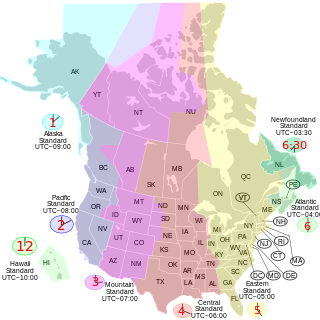Related Research Articles

CNBC is an American business news channel owned by NBCUniversal News Group, a unit of Comcast's NBCUniversal. The network broadcasts business news and analysis programming during the morning, daytime trading day, and early-evening hours, while off-peak hours are filled by business-related documentaries and reality television programming, as well as occasional NBC Sports presentations. CNBC operates an accompanying financial news website, CNBC.com, which includes news articles, video and podcast content, as well as subscription-based services. CNBC's headquarters and main studios are located in Englewood Cliffs, New Jersey, while it also maintains a studio at the Nasdaq MarketSite in Times Square, New York City.

Bravo is an American basic cable television network, launched on December 8, 1980. It is owned by the NBCUniversal Media Group division of Comcast's NBCUniversal. The channel originally focused on programming related to fine arts and film. Since the 2000s, its brand has focused heavily on reality series targeted at 25-to-54-year-old women and the LGBTQIA+ community at large.

Duncan "Dick" Ebersol is an American television executive and a senior adviser for NBC Universal Sports & Olympics. He had previously been the chairman of NBC Sports, producing large-scale television events such as the Olympic Games and National Football League broadcasts.
Golf Channel is an American sports television network owned by the NBC Sports Group division of NBCUniversal, a subsidiary of Comcast. Founded in Birmingham, Alabama, it is currently based out of NBC Sports' headquarters in Stamford, Connecticut.

Olympic Channel was an American pay television sports channel owned by the NBC Olympics, a joint venture between NBC Sports and the United States Olympic Committee. It was dedicated to Olympic sports, and was a franchise of the International Olympic Committee's (IOC) Olympic Channel operation.

SportsNet New York (SNY) is an American regional sports network owned by Sterling Entertainment Enterprises, LLC, itself a joint venture between Fred Wilpon's Sterling Equities, Charter Communications through its acquisition of Time Warner Cable in May 2016 and Comcast, through its NBC Sports Group subsidiary. The channel primarily broadcasts games and related programming involving the New York Mets, but also carries supplementary coverage of the Mets and the New York Jets as well as college sports events.

SportsChannel is the collective name for a former group of regional sports networks in the United States that was owned by Cablevision, which from 1988 until the group's demise, operated it as a joint venture with NBC.
SportsChannel Los Angeles was an American regional sports network owned as a joint venture between the Rainbow Media subsidiary of Cablevision and NBC, and operated as an affiliate of SportsChannel. Headquartered in Los Angeles, the channel broadcast regional coverage of sports events throughout the Southern California, with a focus on Los Angeles-area professional sports teams.

Fox Sports Net Chicago was an American regional sports network that was headquartered in Chicago, Illinois and was owned by Cablevision for most of its history. News Corporation acquired a minority ownership interest in the network in 1997, which Cablevision bought out in 2005. The network was affiliated with SportsChannel from 1987 to 1997, when it became an affiliate of Fox Sports Net.
NBC Sports Northwest was an American regional sports network owned by the NBC Sports Group unit of NBCUniversal, as an affiliate of NBC Sports Regional Networks. The network broadcast regional coverage of professional sports events throughout the Pacific Northwest, focusing primarily on the NBA's Portland Trail Blazers and college sports events involving the Oregon Ducks. It also covered other sports events involving teams within the northwestern United States, including those featuring college and high school teams.

NBC Olympics is the commercial name for the NBC Sports-produced broadcasts of the Summer and Winter Olympic Games as shown in the United States on NBCUniversal platforms. They include the NBC broadcast network and many of the company's cable networks; Spanish language network Telemundo; and streaming on the NBC Sports app, NBCOlympics.com, and Peacock. The event telecasts during the Olympics have aired primarily in the evening and on weekend afternoons on NBC, and varying times on its cable networks. Additional live coverage is available on the aforementioned streaming platforms.
NewSport was an American cable and satellite television network that was owned by Rainbow Programming Holdings, a joint venture between the Rainbow Media subsidiary of Cablevision, NBC and Liberty Media. Predating the launch of the originally similar ESPNews by three years, it focused on 24-hour coverage of sports news and analysis.

The Olympic Games have been broadcast on television since the 1936 Summer Olympics.
The Olympic Games have been televised in the United States since 1960. It has become one of the most popular programs on USA television every four and then two years. The Olympics has been exclusively broadcast on NBC and NBCUniversal's TV networks in the United States since 1988 for the Summer Olympics and 2002 for the Winter Olympics. American television companies are one of the major sources of revenue for the IOC.

Established in 2007, Canada's Olympic Broadcast Media Consortium was a joint venture set up by Canadian media companies Bell Media and Rogers Media to produce the Canadian broadcasts of the 2010 Winter Olympics in Vancouver, British Columbia, Canada, and the 2012 Summer Olympics in London, England, as well as the two corresponding Paralympic Games. Bell owned 80% of the joint venture, and Rogers owned 20%.

The scheduling of television programming in North America must cope with different time zones. The United States has six time zones, with further variation in the observance of daylight saving time. Canada also has six time zones. Mexico has four time zones. This requires broadcast and pay television networks in each country to shift programs in time to show them in different regions.
Tennis on NBC is the de facto branding used for broadcasts of major professional tennis tournaments that are produced by NBC Sports, the sports division of the NBC television network in the United States. The network has broadcast tennis events since 1955.
NBCSN was an American sports television channel owned by the NBC Sports Group division of NBCUniversal, a subsidiary of Comcast. It originally launched on July 1, 1995, as the Outdoor Life Network (OLN), which was dedicated to programming primarily involving fishing, hunting, outdoor adventure programs, and outdoor sports. By the turn of the 21st century, OLN became better known for its extensive coverage of the Tour de France but eventually began covering more "mainstream" sporting events, resulting in its relaunch as Versus in September 2006.
In September 2000, Major League Baseball signed a six-year, $2.5 billion contract with Fox to show Saturday baseball, the All-Star Game, selected Division Series games and exclusive coverage of both League Championship Series and the World Series.
References
- ↑ Gallant, Joseph. "TV Broadcasting History – The World Comes Together in Your Living Room: The Olympics on TV" . Retrieved 6 July 2015.
- ↑ "The 1992 Barcelona Olympics". NBC Sports History Page.
- ↑ Article at findarticles.com
- 1 2 "Triplecast Ads Are Cited." New York Times 17 Jul. 1992: 10.
- ↑ Sarni, Jim. "Quick Remote Trigger Is A Triplecast Must", Miami Sun-Sentinel, 27 July 1992.
- 1 2 Sandomir, Richard. "OLYMPICS; Triplecast: An Olympian Blunder or Innovation?", The New York Times, 29 June 1992.
- 1 2 3 Zoglin, Richard; Ty, William. "How Much Is Too Much?" TIME 10 Aug. 1992: 64.
- ↑ Diamond Joe (25 July 2012). "20 Years After: The Olympics Triplecast". Archived from the original on 4 August 2012. Retrieved 6 July 2015.
- ↑ Sandomir, Richard (25 July 2012). "Happy Anniversary, Triplecast". The New York Times blog. Retrieved 6 July 2015.
- ↑ Sandomir, Richard. "BARCELONA; Overpricing of Olympics' Triplecast Service Is Acknowledged", The New York Times 6 Aug. 1992: 14.
- ↑ "OLYMPICS; Settlement In Triplecast Ads." The New York Times 22 July 1992: 10.
- ↑ Macnow, Glen. "Triplecast May Be A National Failure At This Year's Games NBC Needs A Huge Viewing Audience To Make Its $401 Million Gamble On The Olympics Pay Off. So Far, It's Not Even Close.", Philadelphia Inquirer, 16 July 1992.
- ↑ Sandomir, Richard. "Click, Click, Click: The Year In Gaffes", The New York Times 25 December 1992: 8.
- ↑ Sandomir, Richard. "SPORTS BUSINESS; Some Shaky Precedents for New York Sports Fans." New York Times 28 Aug. 1994: 35.
- ↑ DePrez, Greg. "The Olympics TripleCast: still revolutionary, still relevant", Multichannel News 22 June 1996.
- ↑ Lawler, Richard (27 May 2012). "NBC lays out 2012 London Olympics broadcast plan on TV, internet, apps and in 3D". Engadget. Retrieved 6 July 2015.